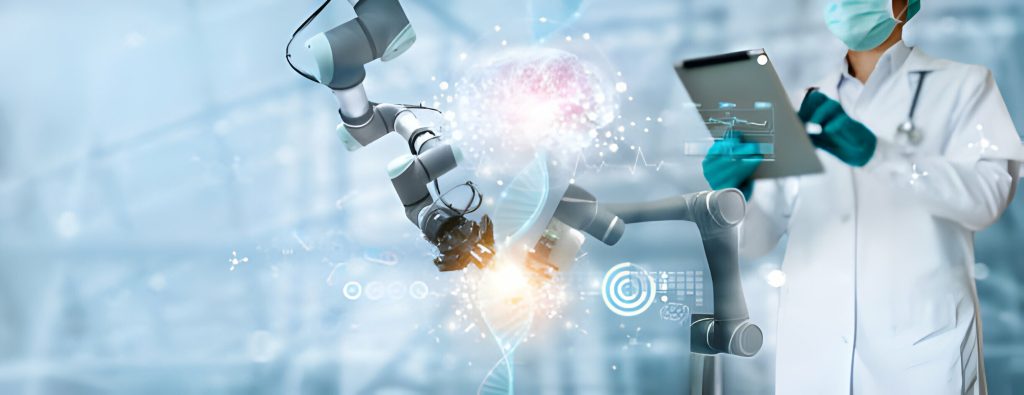Imagine a future where cutting-edge technology analyzes your medical data, images, and records to provide accurate diagnoses in record time. With AI algorithms at the helm, doctors can identify abnormalities in medical imaging with unparalleled precision. Early disease detection and personalized risk assessments are now within reach, thanks to AI’s incredible capabilities. Get ready to explore the game-changing impact of AI on the field of medicine.
Improved Diagnostic Accuracy
AI can improve the accuracy of your medical diagnosis by analyzing patient data and identifying hidden patterns that may not be easily detected by human physicians. With AI, you can expect improved accuracy in your diagnosis, leading to faster identification of medical conditions. This enhanced accuracy enables personalized medicine, where treatment plans are tailored specifically to your needs. By reducing misdiagnosis, AI ensures that you receive the right treatment at the right time. As a result, AI plays a crucial role in enhancing patient outcomes and improving overall healthcare standards. The ability of AI algorithms to analyze vast amounts of data quickly and efficiently allows for more precise diagnoses and better understanding of complex diseases. With AI’s assistance, healthcare professionals can make informed decisions based on comprehensive analysis, leading to improved patient care.
Enhanced Efficiency in Diagnosis
Using machine learning algorithms, medical diagnosis can be significantly improved in terms of efficiency and accuracy. AI technology offers increased efficiency in the diagnostic process, resulting in time-saving benefits for healthcare professionals and patients alike. By streamlining the workflow and automating certain tasks, AI reduces the time required for diagnosis, allowing for quicker treatment decisions. This enhanced efficiency leads to improved patient outcomes as early detection and timely interventions become possible. Additionally, AI-assisted diagnosis systems enhance productivity by providing healthcare professionals with suggested diagnoses based on machine learning algorithms’ analysis of patient records. This not only reduces the number of possible diagnoses but also directs medical personnel towards the most likely reasons for a patient’s condition. Overall, the integration of AI into medical diagnosis brings numerous benefits that optimize healthcare delivery and improve patient care.
| Benefits | Emotional Impact |
|---|---|
| Increased Efficiency | Time-Saving |
| Streamlined Workflow | Enhanced Productivity |
| Improved Patient Outcomes | Better Quality Care |
AI in Medical Imaging
By incorporating advanced technology into medical imaging, you can acquire more accurate and detailed findings to aid in your diagnosis and treatment decisions. AI in Medical Imaging is revolutionizing the field of diagnostics by leveraging artificial intelligence algorithms to analyze medical images such as X-rays, MRIs, and CT scans. Here’s how AI is transforming medical imaging:
- AI for Early Disease Detection: With its ability to identify abnormalities and medical conditions in images, AI helps healthcare professionals detect diseases at an early stage when they are most treatable.
- AI-assisted Diagnosis Support: AI algorithms integrate with clinical databases and electronic health records to assist healthcare professionals in differential diagnosis and treatment decision-making.
- Ethical Considerations in AI: As the use of AI in medical imaging grows, it is crucial to address ethical implications such as transparency, data protection, bias mitigation, and ensuring patient involvement.
- Future of AI-based Diagnostics: The future holds promising advancements with technologies like Quantum AI (QAI) and General AI (GAI) that aim to improve accuracy, speed, efficiency, and provide valuable insights for healthcare providers.
With the continuous development of AI-based diagnostics, we can expect significant improvements in precision diagnoses, early disease detection/prevention, and personalized medicine while addressing important ethical considerations.
Early Disease Detection and Prevention
To improve your overall health and well-being, early detection and prevention of diseases are crucial. AI-based risk assessment plays a significant role in achieving this goal. By analyzing patient data, including genetic information, AI algorithms generate personalized risk assessment scores. This enables healthcare providers to identify potential health risks at an early stage and provide targeted preventive care. Additionally, AI supports patient involvement by empowering individuals to actively participate in their own wellness journey. AI-assisted diagnosis support systems further aid healthcare professionals in making accurate and timely decisions by providing differential diagnosis support. Furthermore, AI’s ability to analyze genetic information allows for a deeper understanding of individual predispositions and helps tailor preventive care plans accordingly. With the integration of AI into medical diagnostics, we can enhance early disease detection and prevention strategies for better health outcomes.
AI-assisted Diagnosis Support Systems
AI-assisted diagnosis support systems integrate with clinical databases and electronic health records, helping healthcare professionals make accurate and timely decisions by providing suggested diagnoses based on machine learning algorithms. These systems offer a range of benefits that enhance clinical decision making and patient care:
- Differential diagnosis support: AI algorithms analyze patient data from various sources, including medical imaging and laboratory results, to generate a list of potential diagnoses. This helps doctors consider different possibilities and narrow down the most likely causes.
- Personalized risk assessment: By analyzing patient data, AI can generate personalized risk assessment scores for individuals. This enables healthcare professionals to identify patients who may be at higher risk for certain diseases or conditions, allowing for targeted preventive measures.
- Integration with electronic health records: AI-assisted systems seamlessly integrate with electronic health records, ensuring easy access to relevant patient information. This comprehensive view of the patient’s medical history aids in accurate diagnosis and treatment planning.
- Patient involvement: AI-supported diagnosis systems encourage active participation from patients in their own healthcare journey. By providing clear explanations and insights into the diagnostic process, patients can better understand their condition and actively collaborate with their healthcare providers.
These AI-assisted diagnosis support systems have the potential to revolutionize clinical practice by improving accuracy, efficiency, and patient outcomes.
Ethical and Legal Considerations in AI
Ethical and legal considerations play a crucial role in the implementation of AI technology for medical diagnosis support systems. When it comes to AI implications, patient privacy is a top concern. It is essential to ensure that patient data is protected and used responsibly. Bias detection is another important aspect, as AI algorithms must be designed to avoid any unfair biases in diagnoses. Accountability measures need to be put in place to ensure that healthcare professionals remain responsible for the decisions made with the assistance of AI technology. Additionally, regulatory frameworks should be established to govern the use of AI in medical diagnosis, ensuring that ethical standards are upheld and patients’ rights are protected throughout the process. By addressing these considerations, we can maximize the potential benefits of AI while minimizing any potential risks or harm.
Potential Impact on Healthcare
Now that we have discussed the ethical and legal considerations in AI, let’s explore the potential impact of AI on healthcare. As an individual seeking medical diagnosis and treatment, you can expect AI to revolutionize the way healthcare is delivered. Here are four ways in which AI is transforming the healthcare industry:
- Improving patient outcomes: With AI-powered algorithms analyzing vast amounts of patient data, healthcare professionals can make more accurate diagnoses and develop personalized treatment plans. This leads to improved patient outcomes and better overall health.
- Enhancing treatment decision making: AI assists healthcare providers in making informed decisions about treatment options by providing real-time insights based on comprehensive analysis of patient data. This helps doctors choose the most effective treatments tailored to each individual’s needs.
- Personalized medicine with AI: By leveraging AI technologies, personalized medicine becomes a reality. AI algorithms can identify patterns and predict how patients will respond to specific treatments, allowing for targeted therapies that maximize efficacy and minimize side effects.
- Role of AI in precision medicine: Precision medicine relies on understanding an individual’s unique genetic makeup and tailoring treatments accordingly. With the help of AI, large genomic datasets can be analyzed quickly, enabling researchers to identify genetic markers associated with diseases and develop targeted interventions.
With these advancements, it is evident that AI has the potential to revolutionize healthcare by improving patient outcomes, enhancing treatment decision-making processes, facilitating personalized medicine, and playing a crucial role in precision medicine initiatives.
Advancements in Deep Learning and Image Recognition
Advancements in deep learning and image recognition have revolutionized the field of medical imaging, allowing for more accurate and efficient analysis of X-rays, MRIs, and CT scans. Deep learning applications and image recognition advancements have enabled AI algorithms to play a significant role in radiology, pathology analysis, and medical device development. In radiology, AI algorithms can analyze medical images with high precision, detecting abnormalities and assisting healthcare professionals in making accurate diagnoses. In pathology analysis, AI can aid in the identification and classification of tumors more efficiently. Moreover, AI is being utilized in the development of medical devices, improving their functionality and performance. With these advancements in deep learning and image recognition, AI is transforming the way medical imaging is conducted, ultimately leading to improved patient care through enhanced diagnostic accuracy and efficiency.
Overcoming Drawbacks of AI in Healthcare
To maximize the potential benefits of AI in healthcare, you should focus on addressing the current limitations and challenges associated with its implementation. Here are some key areas to consider:
- AI limitations: Recognize that AI is not infallible and has its own limitations. It is important to understand the scope and accuracy of AI algorithms in medical diagnosis.
- Data validation: Ensure that the data used for training AI models is accurate, reliable, and representative of diverse patient populations. Proper validation procedures need to be in place to verify the quality of data.
- Transparency challenges: Enhance transparency by providing clear explanations of how AI systems make diagnoses and recommendations. This will help build trust among healthcare professionals and patients.
- Integration issues: Overcome integration challenges by ensuring seamless integration of AI systems with existing healthcare infrastructure. This includes compatibility with electronic health records and other clinical databases.
Standardized Protocols and Regulations
To ensure effective implementation of AI in healthcare, you should prioritize the establishment of standardized protocols and regulations. This is crucial for creating a regulatory framework that governs the use of AI in medical diagnosis and treatment. Standardized protocols provide guidelines for data validation, ensuring the accuracy and reliability of AI algorithms. They also address ethical considerations such as patient privacy and informed consent. However, implementing standardized protocols and regulations can pose challenges. These include the need for clear definitions and guidelines, addressing biases in data collection, and ensuring interoperability between different healthcare systems. Overcoming these implementation challenges requires close collaboration between researchers, healthcare practitioners, policymakers, and data scientists to create a robust framework that promotes the responsible and ethical use of AI in medical diagnostics.
| Standardized Protocols | Regulatory Framework |
|---|---|
| Provide guidelines | Govern the use of AI |
| Address ethical concerns | Ensure patient privacy |
| Validate data accuracy | Require informed consent |
Medical Diagnostics Process and AI
Now that you understand the importance of standardized protocols and regulations in implementing AI in medical diagnostics, let’s explore how AI affects the medical diagnosis and treatment process. Here are a few key points to consider:
- AI applications in medical diagnostics: AI algorithms can analyze various types of medical data, including imaging tests, bio-signals, vital signs, demographic information, and laboratory results. This helps healthcare professionals make more accurate diagnoses.
- AI’s role in personalized medicine: By integrating multiple data sources, AI provides a comprehensive understanding of a patient’s health and underlying causes. This enables personalized risk assessments and tailored treatment plans.
- Challenges in implementing AI in medical diagnostics: There are ethical considerations surrounding transparency, data protection, and bias mitigation. Additionally, integrating AI with existing healthcare systems poses technical challenges.
- AI’s impact on healthcare outcomes: With improved precision in diagnoses and identification of hidden patterns, AI has the potential to enhance treatment decisions and predict patient responses to therapies for better outcomes.
Future of AI-based Medical Diagnostics
The future of AI-based medical diagnostics shows promise in improving the accuracy, speed, and efficiency of diagnoses, as well as providing valuable insights to healthcare providers. Quantum AI applications are being introduced in medical diagnostics to analyze vast amounts of data in real-time, leading to more accurate and efficient diagnoses. In primary care, AI is being used to reduce diagnostic mistakes. For example, Babylon, a global tech company, has developed new AI symptom checkers that use causal reasoning in machine learning to consider different diseases. AI is also making strides in leukemia diagnosis by analyzing blood samples for the presence of cancer. Additionally, AI can analyze blood from rheumatoid arthritis patients and predict their response to treatment in advance. These advancements in AI continue to drive medical diagnostics research forward.
| Quantum AI Applications | AI in Primary Care |
|---|---|
| Analyzes vast amounts | Reduces diagnostic |
| of data in real-time | mistakes |
| AI in Leukemia Diagnosis | AI in Rheumatoid Arthritis Treatment |
|---|---|
| Analyzes blood samples for presence | Analyzes blood samples |
| of cancer | Predicts response to treatment |



